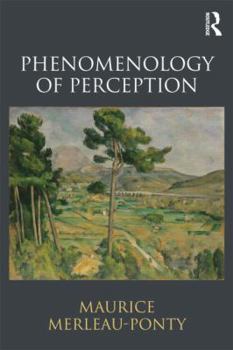Phenomenology of Perception
Select Format
Select Condition 
Book Overview
First published in 1945, Maurice Merleau-Ponty's monumental Ph?nom?nologie de la perception signalled the arrival of a major new philosophical and intellectual voice in post-war Europe. Breaking with the prevailing picture of existentialism and phenomenology at the time, it has become one of the landmark works of twentieth-century thought. This new translation, the first for over fifty years, makes this classic work of philosophy available to a...
Format:Paperback
Language:English
ISBN:0415834333
ISBN13:9780415834339
Release Date:August 2013
Publisher:Routledge
Length:610 Pages
Weight:2.14 lbs.
Dimensions:1.3" x 6.9" x 9.8"
Customer Reviews
3 ratings
Great for Contemporary Philosophy Courses
Published by Thriftbooks.com User , 18 years ago
This book can be part of an excellent upper-division course for undergraduates on the method of philosophical description called phenomenology. Particularly in Merleau-Ponty's description of the lived body and of our intersubjective relations there lies such inspiring attention to our own experience that both myself and my students are often left breathless. This book is both philosophy and poetry, and both aspects of this book are clear and well-researched. Contrary to the unfounded views of one reviewer, I would argue WITH Merleau-Ponty (who says as much in several key places, including his essay "The Philosopher and His Shadow") that Merleau-Ponty's work here is simply an extension of Edmund Husserl's work. Thus, the book fits in nicely after a discussion of some of Husserl's _Cartesian Meditations_ (found in Donn Welton's _Essential Husserl_). Students have also found Merleau-Ponty to be compatible with de Beauvoir and Sartre (both of whom he knew and wrote for and to), Heidegger, and Derrida. In my most recent course, I have used John Russon's compelling book _Human Experience_ first as a way to show some of the phenomenological themes in Merleau-Ponty's book before getting the students to hunker down and try to pull apart Husserl (who is quite difficult) and then Merleau-Ponty (who is a kind of reward for doing the rigorous discipline of reading Husserl). All in all, this is a book that will surely motivate some students towards graduate school work in Continental philosophy.
Counterpiece
Published by Thriftbooks.com User , 22 years ago
Originally, I read this book as part of a Philosophy of the Body course, in companion with Sartre's magnum opus, Being and Nothingness. Trying to keep the two thinkers separate was quite easy, because of the difference in approach and ideas that they both take. Sartre relies on a dualism and intellectualism not easily understood, resulting in a complex and amorphous work, which is still utterly powerful.M-P, however, as one review said, remains in the concrete experience of everyday life. Perception, the way the mind interprets the senses, the importance of memory, time, and freedom in the world, are all utterly important in this work. M-P provides a work which attempts to synthesize psychology, physicality, and philosophy resulting in a more holistic and foundational work than many 20th century philosophers.This book can be read as philosophy or psychology, in fact, any course on perception in a Psychology department should read it. Anyone wishing to discuss the question of Pontius Pilate ("What is truth?") should read this book. It touches on so many themes of intellectual life that it will become perhaps the most influential work of philosophy of the 20th century, vying with Sartre's Being and Nothingness and Heidegger's Being and Time.
If only philosophers would follow his lead today!
Published by Thriftbooks.com User , 23 years ago
As shown in his first book, The Structure of Behavior, and this extension of that piece, Merleau-Ponty was a philosopher who was way ahead of his time. While Husserl was off sputtering abstractly about phenomenology and 'essences', Merleau-Ponty planted himself squarely into the concrete, thick, world of lived experience: this book is a detailed phenomenological description of of attention, memory, space-perception, free will, and other psychological/phenomenological categories. M-P claims that simply by paying attention to this lifeworld, we see that previous philosophical systems have overlooked ineliminable dimensions of what it is like to be a person, and that this oversight has led to radically incomplete philosophical accounts of things like memory, perception, etc..The book is so rich, original, and nuanced that it is hard to do it justice in a short review here. Not saddling himself with narrow academic techniques or fields, he draws on any resources he can to come to make sense of human experience. He cites not only philosophers such as Heidegger and Sarte, but draws equally heavily upon the Gestalt psychologists and neuroscientists of his day. He discusses phantom limbs, experiments on spatial perception, and psychophysical results from the Gestalt psychologists. Many ideas that are popular in modern analytic philosophy and psychology can be found in this book: the view that 'sense data' are simply theoretical constructs, the view that attention focuses on objects not abstract spatial locations, and the claim that our original concepts cannot be understood independently of the embodied interactions with the world where we first come to use them.I fear that Merleau-Ponty's nuanced philosophical psychology will fall through the cracks, being ignored by continental philosophers who focus on other things nowadays, and also by English speaking philosophers who dismiss Merleau-Ponty because he is a continental philosopher.If you consider yourself a philosopher of mind, epistemologist, or a continental philosopher, please read this book. Twice.




